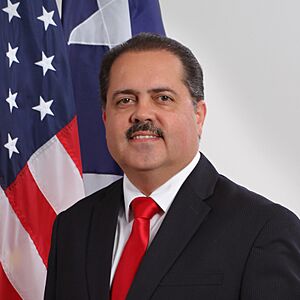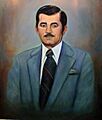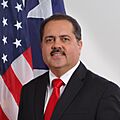President of the Senate of Puerto Rico facts for kids
Quick facts for kids President of theSenate of Puerto Rico  |
|
|---|---|
| Style | The Honorable diplomatic Mister President when presiding over the Senate |
| Nominator | nominated internally by the Senate |
| Appointer | elected internally by the Senate |
| Term length | 4 years |
| Inaugural holder | Antonio R. Barceló August 13, 1917 |
| Formation | March 2, 1917 Jones–Shafroth Act Article III of the Constitution of Puerto Rico |
| Deputy | President pro tempore |
The President of the Senate of Puerto Rico (called Presidente del Senado in Spanish) is the most important leader in the Senate of Puerto Rico. Think of them as the main boss or chairperson of the Senate.
This person is chosen from the senators themselves. They get to vote on laws, just like other senators. The rules for this job come from Article III of the Constitution of Puerto Rico. However, the Constitution doesn't list all their duties. The Senate itself decides what the President does in each new session.
If the President is away, the President pro tempore steps in. The person who does a similar job in the House of Representatives is called the Speaker.
Right now, the President is Jose Luis Dalmau. He is a senator from the Popular Democratic Party.
How the President's Role Started
The job of the President of the Senate began over 100 years ago. It was officially created on March 2, 1917, by a law called the Jones–Shafroth Act. Later, the Constitution of Puerto Rico made this role permanent.
Specifically, Article III says that "The Senate shall elect a President [...] from among [its] members." This means the senators vote for one of their own to be President.
The Constitution doesn't explain exactly what a "president" is or what they should do. So, the Senate makes its own rules. These rules explain the President's job, what they are responsible for, and how they should act.
What the President Does
The President of the Senate has many important jobs. They make sure the Senate follows its own rules. Here are some of their main duties:
- They lead all meetings of the Senate.
- They make decisions about how meetings should run and solve any arguments about rules.
- They choose who will be on the Senate's different committees. Committees are small groups that study specific topics.
- They sign all new laws and plans that the Senate and the Legislative Assembly approve.
- They can call special meetings of the Senate if needed.
- They keep order during Senate meetings. A special officer called the Sergeant-at-Arms usually helps with this.
- They must vote on every issue that comes before the Senate. They cannot choose not to vote.
- They represent the Senate in all official events and discussions.
- They are in charge of how the Senate is run day-to-day. The Secretary of the Senate often helps with these tasks.
- They hire someone to check the Senate's money and spending.
- They make sure there is a public list of all lobbyists. Lobbyists are people who try to influence laws.
- They make sure the public can easily see all the work the Senate does.
- They offer training and learning chances for senators, their helpers, and employees.
Images for kids
 | Frances Mary Albrier |
 | Whitney Young |
 | Muhammad Ali |

















